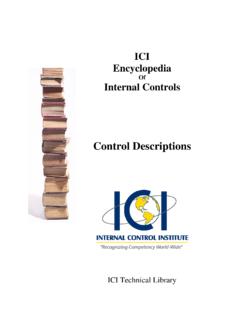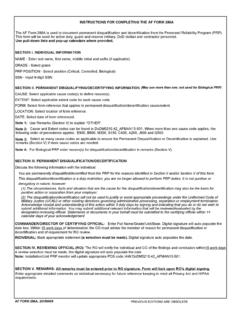Transcription of Professional Certification Programs - COSO internal control
1 Professional Certification Programs Certified internal control Specialists - CICS Certified internal control Professional - CICP Copyright 2009 by internal control Institute Introduction The Certified internal control Specialist (CICS) and Certified internal control Professional (CICP) Programs were developed by leading internal control professionals as a means of recognizing those individuals who demonstrate a predefined level of internal control competency. The CICS / CICP Programs are directed by an independent Certification Board and administered by the internal control Institute (ICI). The program was developed to provide value to the profession, the individual, and the employer.
2 The CICS and CICP certifications entail an aggressive educational program that tests the level of competence in the principles and practices of internal control in the business world. These principles and practices are defined by the Certification Board as the Common Body of Knowledge (CBOK). The Certification Board will periodically update the CBOK to reflect changes in the internal control environment. ICI was established as a Professional association formed to represent the internal control activity. Today, internal control certifications , administered by ICI and The Center of Excellence at St. Petersburg College, is available globally. Overview internal control Institute s certifications are recognized worldwide as the standard for internal control professionals.
3 Certification is a big step; a big decision. Certification identifies an individual as a leader and earns the candidate the respect of colleagues and managers. It is a formal acknowledgement that the recipient has an overall understanding of the disciplines and skills represented in a comprehensive Common Body of Knowledge (CBOK) for a respective internal control discipline. The CICS and CICP Programs establish the standards for initial qualification and continuing improvement of Professional competence. This ICI Certification program helps to: 1. Define the tasks (skill categories) associated with internal control duties in order to evaluate skill mastery. 2. Demonstrate an individual s willingness to improve professionally. 3. Acknowledge attainment of an acceptable standard of Professional competency.
4 4. Aid organizations in selecting and promoting qualified individuals. 5. Motivate personnel having internal control responsibilities to maintain their Professional competency. 6. Assist individuals in improving and enhancing their organization s system of internal control . 7. Improves the governance processes of the organization through the Professional s knowledge and skills of internal control practices. 8. Enhances the organization s ability to comply with applicable laws and regulations with improved internal control processes. Benefits of Professional Certification As with any Professional Certification program, there are significant benefits that accrue to the Professional as well as the organization he or she represents. The most immediate advantage is that the Professional has attained a level of competency that is recognized by his/her peers.
5 This in itself raises the confidence level of the individual. However, for the organization, the most immediate advantage is that a foundation level of knowledge and skill has been established within the profession as defined in the Common Body of Knowledge (CBOK). This serves as a baseline that defines quality and productivity expectations. Reputable and accredited Certification Programs have three very important ingredients. These are: (1) a minimum level of knowledge, experience and skill, (2) a code of conduct, and (3) a process for improving knowledge, skills and performance. Level of skills and knowledge This foundation is best established by experienced professionals who are working in the profession and are actively engaged in the practice. These individuals are typically involved in everyday, real-world activities. They are best qualified to identify the challenges and skill dimensions of the profession.
6 And, they are normally well-equipped to identify the specific requirements for a CBOK (Common Body of Knowledge). Code of Conduct Every profession must operate by a code of ethics. This truly defines the profession and the integrity of those involved. This code of conduct must also be sufficiently strict so that any violators must be decertified to insure Professional respect and integrity. Continuous Improvement The Common Body of Knowledge of a profession must be continuously updated as changes and enhancements occur. A periodic recertification requirement within the program is essential. This insures that all certified professionals remain current and are kept abreast of the changes to maintain individual quality, productivity, skill and performance. Benefits of Becoming a CICS As stated, the CICS program was developed to provide value to the profession, the individual, the employer, and co-workers.
7 The following information is data has been identified a real testimonial to the benefits and reasons to make the effort to become a CICS. Value Provided to the Profession The organization s system of internal control is often viewed as a Top Management issue even though many individuals spend large amounts of time working on various aspects of internal controls. The CICS program was designed to recognize internal control Specialists as professionals by providing: Common Body of Knowledge (CBOK) The Certification Board defines the skills upon which internal control Certification is based. The current CBOK includes skill categories fully described in this preparation guide. Examination Process to Evaluate Competency The successful candidate must pass an examination that is based on the CBOK.
8 You must receive a grade of 75% to become certified. Code of Ethics The successful candidate must agree to abide by a Professional Code of Ethics as specified by the Certification Board. See Code of Ethics for an explanation of the ethical behaviors expected of all certified professionals. Value Provided to the Individual The individual obtaining the CICS Certification receives the following values: Recognition by Peers of Personal Desire to Improve A personal desire for self-improvement and peer recognition is an excellent reason for obtaining the CICS Certification . Some individuals may be required or strongly encouraged by their employer to sit for the examination. Increased Confidence in Personal Capabilities CICS Certification increases your confidence to perform your job more effectively.
9 Much of that confidence came from studying for the examination. Recognition by Management for Professional Achievement Management greatly respects those who put forth the personal effort needed for self-improvement. Organizations recognize and reward individuals for self-improvement in many ways: One-time bonus, Immediate average salary increase. Non-monetary recognitions may include: Recognized in staff meetings. Recognized in newsletters or email. Management visits or calls, and lunch with the boss. Value Provided to the Employer With the need for increased internal control quality and reliability, employing CICS provides value such as: Increased Confidence by Users and Customers internal control users and customers expressed confidence in CICS s to effectively build, acquire, and maintain well controlled systems.
10 Improved Processes to Build/Acquire/Maintain, Operate and Measure internal control systems CICSs use their knowledge and skills to continuously improve the work processes. CICSs know what to measure, how to measure it, and then prepare an analysis to aid in the decision making process. Independent Assessment of Competencies The CICS program is directed by a Certification Board of independent internal control experts. Through examination and recertification, they provide an independent assessment of the CICS s internal control competencies, based on a continuously strengthening of the Common Body of Knowledge. internal control Competencies Maintained Through Recertification Yesterday s internal control competencies are inadequate for today s challenges.





